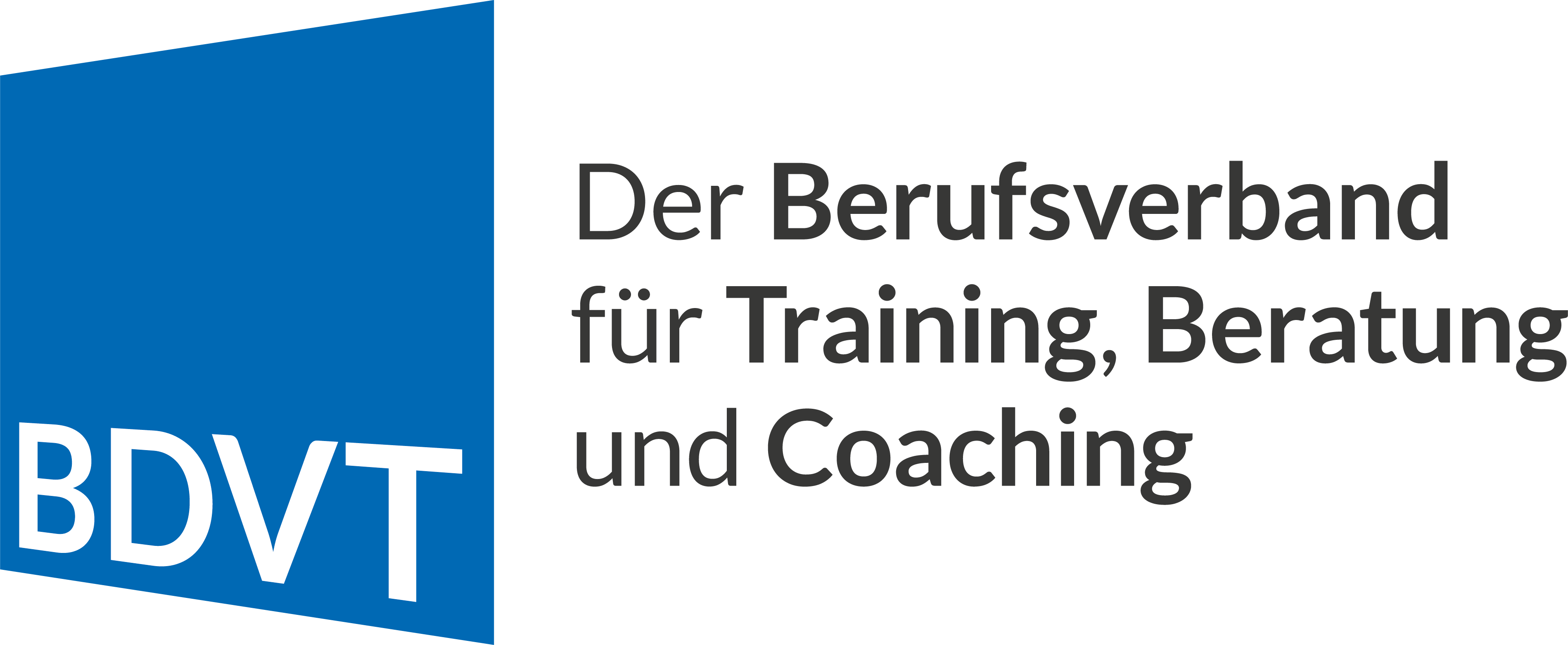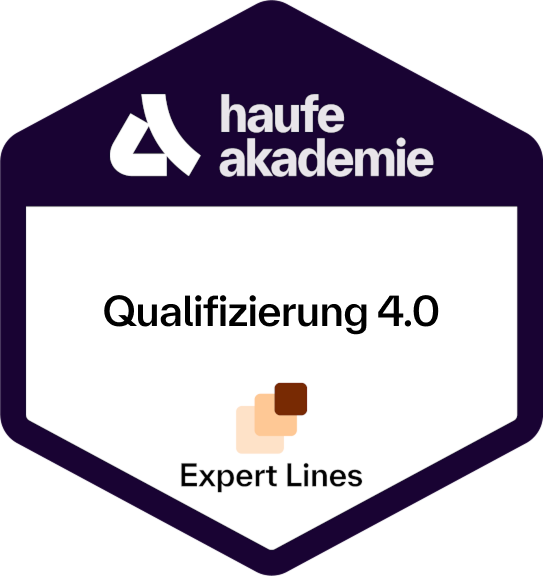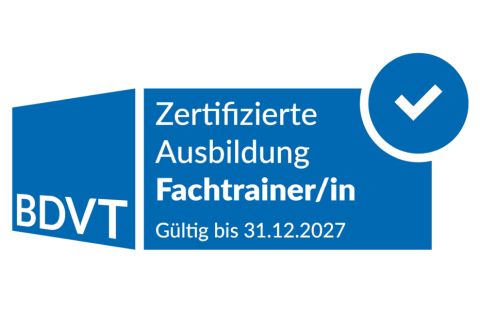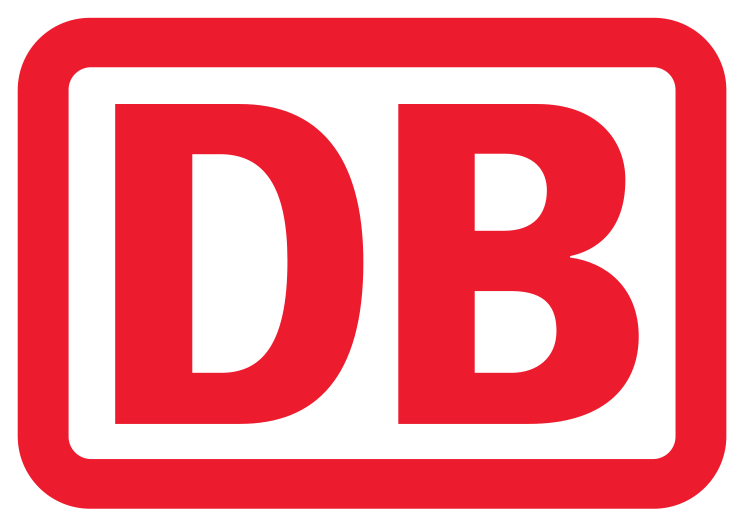Training for certified trainer
Certified by the professional association BDVT e.V.
Certification partner: BDVT
 The professional association BDVT e. V. has examined and recognized this training as a trainer . The examination for this training course is taken by the BDVT e. V. and the Haufe Akademie . If you pass the exam, you will be certified by the BDVT and the Haufe Akademie. This gives you a recognized qualification.
The professional association BDVT e. V. has examined and recognized this training as a trainer . The examination for this training course is taken by the BDVT e. V. and the Haufe Akademie . If you pass the exam, you will be certified by the BDVT and the Haufe Akademie. This gives you a recognized qualification.
- Basics of adult education
- Training process
- The training follow-up
- Initial ideas for the audit concept
- Interactive work with (learning) groups
- Moderation techniques to activate groups
- Lively presentations and a variety of methods for presenting content
- Blended learning methods - webinars, how does "non-presence learning" work?
- The professional appearance - enticing people to learn
- The first aid kit - mastering difficult seminar situations
- The successful format - our training concept
- Final thesis: Creation of a training concept
Contents
The concept
This practical training course will lay the foundations for your successful career as a trainer. You will acquire versatile mediation and methodological skills and benefit from the opportunities of a constant learning group. After this course, you will be able to make your training sessions, presentations and moderations more lively and achieve your training objectives more effectively.
Module 1: Didactic planning
Basics of adult education
- How does learning work for adults?
- Fundamentals of neurological knowledge.
- What do didactics, methodology and learning objectives mean and why are they important?
- From the needs assessment to the training concept.
- Learning objectives, learning objective hierarchy.
- The training guide, creating a concept.
- Planning design: Goal - content - methods - media.
- The initial, the story and the benefit for the attendees - clarify relevance.
- Basic attitude as a trainer, human image and role.
Training process
- Different phases of a training course and its methods.
- Different learning principles.
- Deepening content with the right method (Part 1).
- Methods for ensuring transfer and monitoring learning objectives during the training.
The training follow-up
- Reflection.
- Professional handling of feedback.
- Evaluation and learning objective control (using the example of ErKon - success control).
Initial ideas for the audit concept
Module 2: Methods and media competence
Interactive work with (learning) groups
- Working with groups - enabling insights.
- Basics of group dynamics.
Moderation techniques to activate groups
- Examples of "agile" and interactive workshop moderation.
Lively presentations and a variety of methods for presenting content
- Which method for which topic?
- Deepening content with the right method (Part 2).
- PowerPoint, Prezi and co. or would you prefer "museum and clothesline"?
Blended learning methods - webinars, how does "non-presence learning" work?
- Synchronous (e.g. Adobe Connect) and asynchronous methods (e.g. Blink.it, forum, emails).
- Basics of visualization with "live media".
Tools and exercises.
Module 3+4: Voice - Body language - Effect - Mastering difficult situations and exam preparation
The professional appearance - enticing people to learn
- Didactic imperative for trainers: "Don't be boring!"
- How is impact created?
- Special trainers- "targeted priming".
- Voice training, voice exercises - cold start in the morning, cool down in the evening.
- Playing with emotions.
- "Touching" people without touching them.
- Body language and appearance.
- Didactic use of space and body language.
- Entertainment in training, laughter as a learning turbo.
- Exercise lectures with video feedback.
The first aid kit - mastering difficult seminar situations
- Prevention strategies in preparation and entry scenarios.
- What difficult situations could arise?
- From frequent speakers, co-trainers and superiors...!
- "It's no good anyway!" - Dealing with killer phrases.
- Self-fulfilling prophecy - it will come as we expect!
- Promising intervention options.
- Returns, feedback or "sometimes silence is golden"...
- Practice, practice, practice...!
- Self-reflection and intervision.
Module 5:
Your final thesis: Creating a training concept
You document your independent work on a training project in a written paper (at least 20 pages). In this way, you will further expand your knowledge and ensure direct learning success for your practice.
You are free to choose a training topic that is relevant to you. This paper must be submitted 5 weeks before the examination date.
Module 6:
Final examination
The examination consists of a 30-minute training sequence and a 20-30-minute examination/reflection discussion.
Examination committee: Examiners from BDVT e.V. and the Haufe Akademie.
Learning environment
The Blink.it learning environment accompanies you before and after the classroom training and helps you to consolidate the learning content. For example, it contains small tasks, videos and texts. You can also add feedback or questions to individual elements. The learning environment is also available for mobile devices. You will receive your access by email shortly before your first training event.
Further information can be found in our privacy policy at III.U https://www.haufe-akademie.de/Datenschutz
Your benefit
Class group: Take advantage of the dynamics of a fixed learning group.
Certification: This recognized qualification gives you a head start as a trainer.
Exam: You will take a practice-oriented exam in front of the BDVT e.V. and the Haufe Akademie .
Individual feedback: In each module, you will receive practical impulses and individual feedback on your work in front of and with people.
Practical phases: Between modules, you have the opportunity to try out what you have learned in practice.
Professional expertise: Learn from the best! All trainers used have over 10 years of experience and specialize in train-the-trainer courses.
Advice: Our training advisors are available to answer your personal questions at any time before and during the training.
Learning transfer: Between the modules, you will work on smaller tasks that promote learning transfer.
Methods
Expert input, interactive development of content in a team, numerous exercise sequences with individual feedback and tasks. The focus is always on experiential and action-oriented learning.
Between the modules there are smaller, learning transfer-promoting tasks.
Recommended for
All existing and future specialist trainers who want to put their training activities on a professional and solid footing and benefit from a constant learning group. This recognized training is primarily aimed at company training managers and trainers, specialists and managers in companies with responsibility for successful internal training courses, seminars and workshops.
Examination and final certificate
The examination is taken after all modules have been completed and a written elaboration of the candidate's own training project has been submitted at least four weeks before the examination date. The examination consists of a 30-minute training sequence followed by an examination and reflection discussion. The examination is conducted jointly by the BDVT and the Haufe Akademie .
Further recommendations for "Training for certified trainer"
FAQ on training as a certified trainer
Of course, we will then try to find a solution together so that you can still complete your training.
Throughout the certified trainer course , you can communicate via your learning environment. The trainers also post small learning impulses, preparation tasks, videos or photo logs there before and between the modules.
Yes, the practical exam relates to the final project. It consists of a simulated, 30-minute sequence of your independently developed concept.
The exam consists of a 30-minute training sequence followed by a 30-minute exam and reflection session. During the training sequence, the other exam participants form your participant group. The examiners sit in the background as silent observers.
You can freely choose a training topic that is relevant to you, preferably from your direct work context. We are also happy to advise you on the selection and implementation of your topic.
The training is primarily aimed at company training managers and trainers, specialists and managers in companies with responsibility for successful internal training courses, seminars and workshops. It is also suitable for people who want to develop professionally and/or are looking for a (part-time) job as a trainer .
No, no special prior knowledge is required.
The certified trainer training is suitable for all topics, especially if subject matter experts want to pass on their knowledge, e.g. for software training, internal sales training, training for machines, for customer communication and contact, company instructions, university lecturers.
Start dates and details
The participation fee includes
- one joint lunch per full seminar day,
- Catering during breaks and
- extensive working documents.
Hotel accommodation costs are settled directly with the hotel. You will find a reservation form for hotel bookings in your learning environment.
The participation fee includes
- one joint lunch per full seminar day,
- Catering during breaks and
- extensive working documents.
Hotel accommodation costs are settled directly with the hotel. You will find a reservation form for hotel bookings in your learning environment.
The participation fee includes
- one joint lunch per full seminar day,
- Catering during breaks and
- extensive working documents.
Hotel accommodation costs are settled directly with the hotel. You will find a reservation form for hotel bookings in your learning environment.
The participation fee includes
- one joint lunch per full seminar day,
- Catering during breaks and
- extensive working documents.
Hotel accommodation costs are settled directly with the hotel. You will find a reservation form for hotel bookings in your learning environment.
The participation fee includes
- one joint lunch per full seminar day,
- Catering during breaks and
- extensive working documents.
Hotel accommodation costs are settled directly with the hotel. You will find a reservation form for hotel bookings in your learning environment.
The participation fee includes
- one joint lunch per full seminar day,
- Catering during breaks and
- extensive working documents.
Hotel accommodation costs are settled directly with the hotel. You will find a reservation form for hotel bookings in your learning environment.
 4.7
4.7













